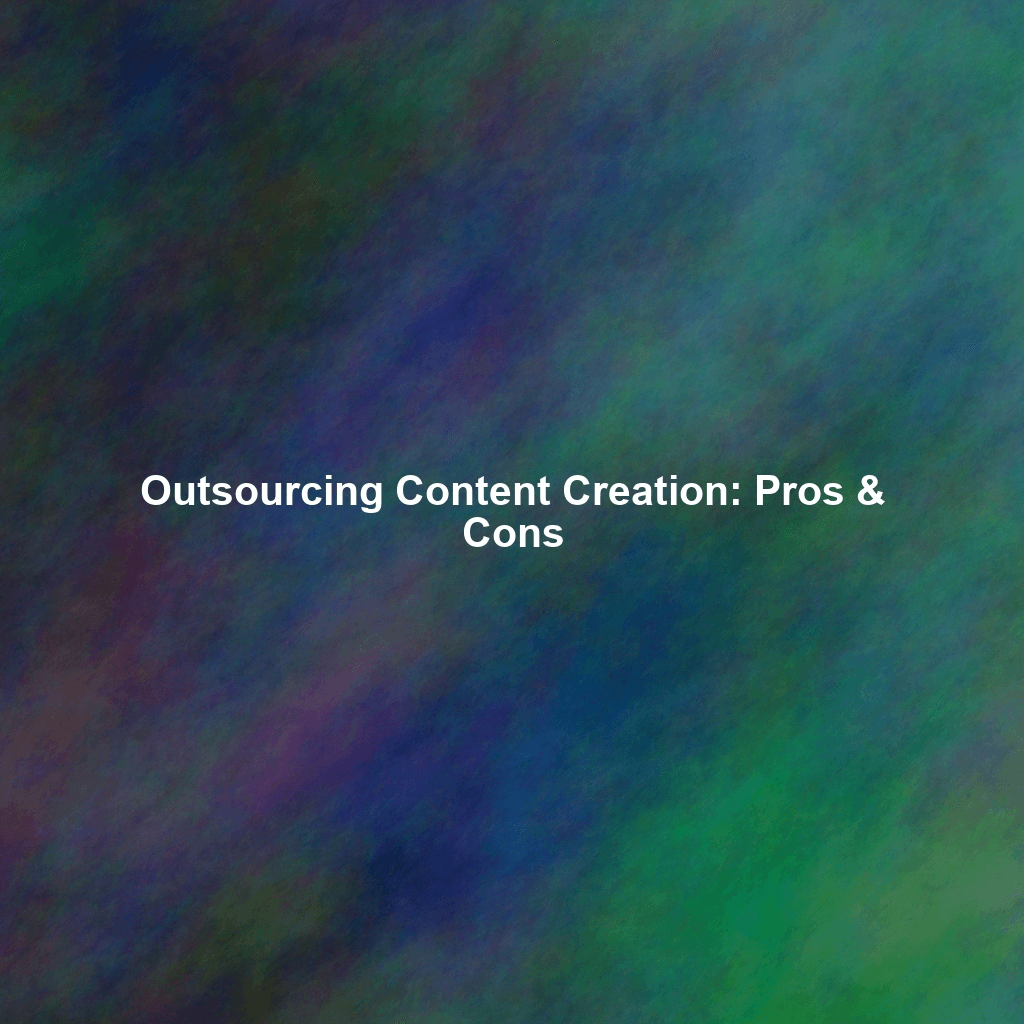The Content Creation Conundrum: To Outsource or Not to Outsource?
In the fast-paced world of content marketing, the demand for fresh, engaging, and high-quality content is relentless. Businesses of all sizes are constantly striving to produce blog posts, articles, social media updates, ebooks, and more to attract, engage, and convert their target audience. But creating all this content in-house can be a significant drain on resources. This is where outsourcing content creation comes into play, offering a seemingly attractive solution for many businesses. However, deciding whether or not to outsource requires careful consideration of the potential benefits and drawbacks. This article dives deep into the pros and cons of outsourcing content creation, helping you make an informed decision that aligns with your overall content marketing strategy and business goals.
What Exactly is Outsourcing Content Creation?
Simply put, outsourcing content creation involves hiring external individuals or agencies to produce content on behalf of your company. This can encompass a wide range of content types, including:
- Blog posts and articles
- Website copy
- Social media content
- Email marketing campaigns
- Ebooks and white papers
- Video scripts
- Infographics
- Podcast scripts
Instead of relying solely on internal resources, you leverage the expertise and bandwidth of external content creators to meet your content needs. This can free up your in-house team to focus on other crucial aspects of your business, such as strategy development, campaign management, and data analysis.
The Allure of Outsourcing: Pros of Content Creation
Outsourcing content creation offers several compelling advantages, especially for businesses with limited resources or specific expertise gaps.
1. Cost-Effectiveness: Is it Really Cheaper?
One of the primary drivers behind outsourcing is often cost. Hiring a full-time content writer involves salaries, benefits, training, and overhead costs. Outsourcing, on the other hand, allows you to pay for content on a project basis or retainer, potentially leading to significant cost savings. You only pay for what you need, when you need it, avoiding the ongoing expenses associated with a permanent employee. However, be wary of extremely low prices, as they often correlate with lower quality content that requires significant editing or doesn’t effectively meet your marketing objectives.
2. Access to Specialized Expertise: Bridging the Skills Gap
Not every business has in-house writers with expertise in every niche or industry. Outsourcing allows you to tap into a vast pool of specialized writers who possess in-depth knowledge and experience in specific areas. This can be particularly beneficial for complex or technical topics where accuracy and authority are paramount. Need a white paper on blockchain technology? A case study on AI implementation in healthcare? Outsourcing allows you to find writers with the relevant expertise to deliver high-quality, informative content.
3. Scalability and Flexibility: Adapting to Changing Needs
Content needs can fluctuate significantly depending on the season, marketing campaigns, and overall business goals. Outsourcing provides the scalability and flexibility to quickly ramp up or down your content production based on demand. You can easily adjust your content volume without the constraints of internal resources or the complexities of hiring and firing employees. This agility allows you to respond effectively to market changes and capitalize on emerging opportunities.
4. Fresh Perspectives and Ideas: Breaking Creative Barriers
Sometimes, an outside perspective can be invaluable in breaking through creative barriers and generating fresh ideas. Outsourced content creators can bring new insights and approaches to your content strategy, helping you develop innovative and engaging content that resonates with your audience. They can also challenge your assumptions and offer alternative viewpoints, leading to more well-rounded and impactful content.
5. Focus on Core Business Activities: Prioritizing What Matters Most
By outsourcing content creation, you free up your internal team to focus on their core responsibilities and strategic initiatives. Instead of spending time writing blog posts or managing social media, your marketing team can concentrate on developing overall marketing strategies, analyzing data, and driving revenue growth. This allows you to maximize the productivity and efficiency of your internal team.
The Shadows of Outsourcing: Cons to Consider
While outsourcing content creation offers numerous advantages, it’s crucial to be aware of the potential drawbacks.
1. Quality Control Challenges: Ensuring Consistent Excellence
Maintaining consistent quality across all outsourced content can be a significant challenge. Different writers have different writing styles, levels of expertise, and understanding of your brand voice. Implementing a rigorous quality control process, including detailed style guides, thorough editing, and clear communication, is essential to ensure that all content meets your standards. Failing to do so can result in inconsistent branding, inaccurate information, and ultimately, damage to your reputation.
2. Communication Barriers: Bridging the Distance
Effective communication is paramount to successful outsourcing. Language barriers, time zone differences, and a lack of face-to-face interaction can all create communication challenges. Clearly defining project requirements, providing detailed briefs, and establishing regular communication channels are crucial for ensuring that the outsourced writers understand your expectations and deliver content that aligns with your vision. Utilizing project management tools and scheduling regular video calls can also help facilitate effective communication.
3. Lack of In-Depth Brand Knowledge: Understanding Your Unique Identity
Outsourced writers may not have the same level of in-depth knowledge of your brand, products, and target audience as your internal team. This can sometimes result in content that feels generic or doesn’t accurately reflect your brand values and messaging. To mitigate this risk, it’s essential to provide outsourced writers with comprehensive brand guidelines, detailed information about your target audience, and examples of successful content. Regular feedback and collaboration can also help them develop a deeper understanding of your brand.
4. SEO Risks: Prioritizing Relevance and Authenticity
While outsourcing can help you produce more content, it’s important to ensure that the content is optimized for search engines without sacrificing quality and authenticity. Some outsourced writers may resort to keyword stuffing or other black-hat SEO tactics in an attempt to improve rankings. This can ultimately harm your website’s reputation and result in penalties from search engines. Focus on finding writers who understand SEO best practices and prioritize creating high-quality, relevant content that naturally incorporates keywords.
5. Potential for Plagiarism: Safeguarding Originality
The risk of plagiarism is a serious concern when outsourcing content creation. To protect yourself, always use plagiarism detection tools to thoroughly check all outsourced content before publishing it. It’s also important to choose reputable writers or agencies with a proven track record of producing original content. Clearly communicate your expectations regarding originality and emphasize the importance of ethical writing practices.
6. Managing Multiple Contributors: Maintaining Cohesion and Efficiency
Outsourcing to multiple writers can create logistical challenges in terms of managing workflow, tracking progress, and ensuring consistency across all content. Implementing a robust project management system and assigning a dedicated content manager can help streamline the process and ensure that all content is delivered on time and to the required standard. Clear communication and collaboration tools are also essential for keeping everyone on the same page.
Making the Right Choice: Is Outsourcing Right for You?
The decision of whether or not to outsource content creation ultimately depends on your specific needs, resources, and priorities. Consider the following factors:
- Your Budget: Can you afford to hire in-house writers or is outsourcing a more cost-effective option?
- Your Content Needs: How much content do you need to produce and what types of content are required?
- Your Internal Resources: Do you have the internal expertise and bandwidth to create all the content you need?
- Your Quality Standards: How important is it to maintain consistent quality and branding across all content?
- Your Control Requirements: How much control do you want to have over the content creation process?
If you have limited resources, need specialized expertise, or require a flexible content solution, outsourcing may be a viable option. However, if quality control, brand consistency, and in-depth brand knowledge are paramount, building an in-house content team may be a better choice. In many cases, a hybrid approach, combining in-house resources with outsourced support, can be the most effective solution.
Tips for Successful Content Creation Outsourcing
If you decide to outsource content creation, here are some tips for ensuring a successful partnership:
- Clearly Define Your Goals and Objectives: What do you want to achieve with your content marketing efforts?
- Develop Detailed Content Briefs: Provide writers with clear instructions, target audience information, and examples of successful content.
- Establish Clear Communication Channels: Set up regular communication channels and provide timely feedback.
- Implement a Rigorous Quality Control Process: Review and edit all outsourced content before publishing it.
- Build Long-Term Relationships: Foster strong relationships with your outsourced writers to ensure consistent quality and understanding of your brand.
- Use a Project Management System: Utilize tools to organize content, deadlines, and feedback
In Conclusion: Weighing the Options for Content Success
Outsourcing content creation can be a powerful tool for businesses looking to scale their content marketing efforts and achieve their business goals. However, it’s crucial to carefully weigh the pros and cons and develop a strategy that aligns with your specific needs and priorities. By understanding the potential benefits and drawbacks, implementing effective quality control measures, and fostering strong relationships with your outsourced writers, you can leverage the power of outsourcing to create high-quality, engaging content that drives results.
 Skip to content
Skip to content

